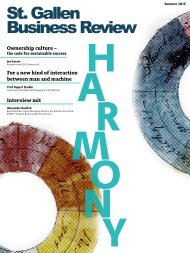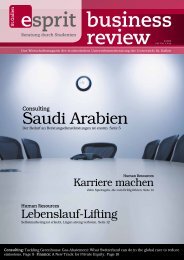Sicherheit und Risiko
St.Gallen Business Review Winter 2012
St.Gallen Business Review
Winter 2012
Erfolgreiche ePaper selbst erstellen
Machen Sie aus Ihren PDF Publikationen ein blätterbares Flipbook mit unserer einzigartigen Google optimierten e-Paper Software.
ESPRIT St.Gallen Business Review<br />
with its provisions. According to this view, the treaty<br />
was concluded on the <strong>und</strong>erstanding that member<br />
states were opting „for a sort of provisional virginity”,<br />
making their abstention dependent on the non-occurrence<br />
of events “that would force them to reconsider“<br />
(Johan Holst). In fact, Article X of the NPT allowed<br />
members to withdraw on a mere three months’ notice<br />
in the event that „extraordinary events jeopardize<br />
its supreme interests“—and this permissive wording<br />
was, of course, no accident.<br />
In spite of the tenuous nature of its bargains, the<br />
nonproliferation regime survived the Cold War more<br />
or less intact. Since then, however, existing provisions<br />
and safeguard mechanisms have increasingly failed<br />
to stem the diffusion of nuclear capabilities. Whereas<br />
both the social reality and configurations of interest<br />
and power have continued to evolve, the institutional<br />
framework in essence has not. Moreover, the international<br />
community has been unable or unwilling to<br />
address the congenital flaws in the regime or to deal<br />
effectively with their practical consequences. North<br />
Korea is a case in point, and so is Iran. Beyond concerns<br />
over the more established cases of Israel and<br />
Japan, suspicions persist as regards the intentions of<br />
Brazil and Saudi Arabia. As Andrew O’Neil points out,<br />
“one of the unmistakable trends internationally since<br />
the end of the Cold War has been the increasing number<br />
of states seeking to acquire, at the very least, a<br />
threshold nuclear capability.”<br />
Since the nonproliferation regime was set up to<br />
impose constraints on state actors, it is particularly<br />
ill-equipped to deal with private actors who engage<br />
in illicit nuclear commerce. The network of Pakistan’s<br />
Abdul Qadeer Khan, for example, was actively involved,<br />
over a period of nearly 20 years, in the delivery<br />
of sensitive dual-use technology across a host of state<br />
and non-state actors.<br />
A regime beyond repair<br />
If the preservation of the nonproliferation regime<br />
depends on achieving a reasonable consensus to<br />
the effect that ‘nonproliferation’ is a realistic objective<br />
in the first place, prospects are grim indeed—for this<br />
consensus has broken down. Can it be rebuilt? Can<br />
the regime as such be revived? I do not think so. On<br />
top of flagrant cases of noncompliance on the part of<br />
have-nots, keep in mind that the established nuclear<br />
powers themselves (the permanent five members of<br />
the U.N. Security Council) keep nuclear weapons in<br />
their arsenal both physically and conceptually. Consider<br />
also that Israel, India, and Pakistan have paid little<br />
or no price for going nuclear outside the regime. The<br />
credibility and with it the integrity of the nonproliferation<br />
project has long been damaged beyond repair.<br />
Against the backdrop of the past twenty years,<br />
it is remarkable to see just how many strategists in<br />
government, in academia, and in nongovernmental<br />
organizations continue to argue that the nonproliferation<br />
battle is still worth fighting. What is more, in<br />
2009 U.S. President Barack Obama joined a long list of<br />
political and academic celebrities united in the cause<br />
of “Global Zero”, declaring complete nuclear disarmament<br />
a top priority.<br />
The goal of ridding humanity of nuclear weapons<br />
through the full elimination of arsenals has enjoyed<br />
moral, emotional, and even intellectual appeal for decades.<br />
Proponents of Global Zero are united in one<br />
irrefutable argument: if the international community<br />
could abolish these weapons, nuclear war would no<br />
longer pose the ultimate threat to life and security.<br />
Based upon Article VI of the Non-Proliferation Treaty,<br />
they hold that member states are bo<strong>und</strong>, both morally<br />
and legally, to rid the world of nukes. Some demand<br />
that the established haves lead the way and embark<br />
«We need to give up<br />
on the illusion that<br />
full nuclear<br />
disarmament<br />
represents a viable<br />
policy option <strong>und</strong>er<br />
present conditions.»<br />
immediately on a significant reduction; others argue<br />
that the process needs to be more incremental to succeed.<br />
Back to zero, really?<br />
Crucially, all proponents start from the premise<br />
that Global Zero can be achieved <strong>und</strong>er present structural<br />
conditions. Not surprisingly, they fail to provide<br />
plausible answers to f<strong>und</strong>amental questions—questions<br />
regarding both f<strong>und</strong>amental assumptions and the<br />
process of disarmament. To name but a few: does peril<br />
indeed come from the size of arsenals? Is stability<br />
a function of numbers or of incentives? How would<br />
any nuclear power be compelled to disarm? And even<br />
14<br />
Winter 2012


















